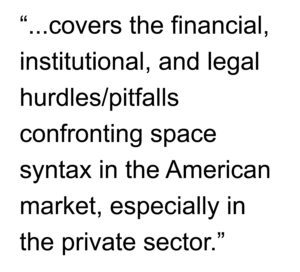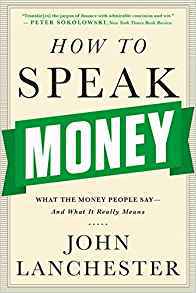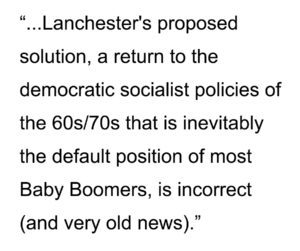The Hidden Corruption of Regular Grids discusses the remarkable progress space syntax has made in research and practice around the world over the last 40 years. However, this is not the case in the United States. Space syntax remains on the fringes of American planning and development. This is odd since there seems to be several inherent advantages for widespread application of space syntax in an American context, i.e. ongoing large-scale urban growth, an established research program at one of the country’s leading universities, and seemingly ‘natural’ allies in professional practice.  The course covers the financial, institutional, and legal hurdles/pitfalls confronting space syntax in the American market, especially in the private sector. Using a series of ‘back-of-the-napkin’ financial calculations common to the American development process, the course demonstrates how these challenges can transform into a distinct advantage for advocating the cause of the space syntax in the United States. The course concludes by discussing the enormous challenges and opportunities for space syntax in America today (1.0 hour course).
The course covers the financial, institutional, and legal hurdles/pitfalls confronting space syntax in the American market, especially in the private sector. Using a series of ‘back-of-the-napkin’ financial calculations common to the American development process, the course demonstrates how these challenges can transform into a distinct advantage for advocating the cause of the space syntax in the United States. The course concludes by discussing the enormous challenges and opportunities for space syntax in America today (1.0 hour course).
Key concepts: finances, land use law, professional practice, planning, development, and space syntax.
Instructor: Dr. Mark David Major, AICP, CNU-A
Click here to purchase this course ($9.99), which includes an one-hour video presentation and PDFs of the published article and slide handout.
NOTE: This course is geared towards the space syntax community and people interested in its application in the United States. However, there is actually very little space syntax in the course since it primarily discusses the legal and financial hurdles in the American real estate development process for space syntax and similar scientific approaches. Even if you are not familiar with space syntax, then the subject matter should not be considered a deterrent.
Note: We are beta-testing with these initial course offerings so if you have any issues accessing the course material, please do not hesitate to contact us at courses@outlaw-urbanist.com. Thank you!




 This means Lanchester’s proposed solution, a return to the democratic socialist policies of the 60s/70s that is inevitably the default position of most Baby Boomers, is incorrect (and very old news). As I recall, Reagan/Thatcher never supported the concept of near-monopolies as part of their broader economic strategy, which has, in fact, emerged in modern corporatism of the Western societies over the last 2-3 decades. This suggests that economic model we should be looking towards for a correction in the obvious abuses of the Neo-Liberal economic model (see bank fraud/credit crunch of the Great Recession) lies in the early 20th century ‘trust-busting’ model of Teddy Roosevelt. In this sense, the “Afterwood” serves its purpose by forcing anyone with a basic understanding of history and economics to draw to their own, more rational conclusions in order to reconcile the inherent contradictions of Lanchester’s argument. How to Speak Money: What the money people say… and what they really mean is worth the read but it should be read thoughtfully, not blindly. Grade: 3 1/2 stars
This means Lanchester’s proposed solution, a return to the democratic socialist policies of the 60s/70s that is inevitably the default position of most Baby Boomers, is incorrect (and very old news). As I recall, Reagan/Thatcher never supported the concept of near-monopolies as part of their broader economic strategy, which has, in fact, emerged in modern corporatism of the Western societies over the last 2-3 decades. This suggests that economic model we should be looking towards for a correction in the obvious abuses of the Neo-Liberal economic model (see bank fraud/credit crunch of the Great Recession) lies in the early 20th century ‘trust-busting’ model of Teddy Roosevelt. In this sense, the “Afterwood” serves its purpose by forcing anyone with a basic understanding of history and economics to draw to their own, more rational conclusions in order to reconcile the inherent contradictions of Lanchester’s argument. How to Speak Money: What the money people say… and what they really mean is worth the read but it should be read thoughtfully, not blindly. Grade: 3 1/2 stars